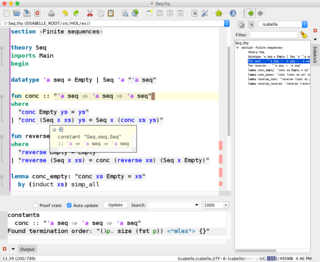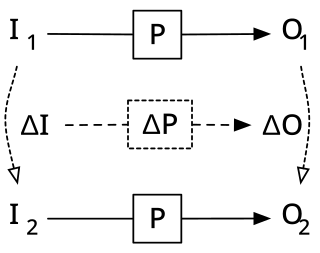Related Research Articles
In computer science, functional programming is a programming paradigm where programs are constructed by applying and composing functions. It is a declarative programming paradigm in which function definitions are trees of expressions that map values to other values, rather than a sequence of imperative statements which update the running state of the program.
In computer science, formal methods are mathematically rigorous techniques for the specification, development, analysis, and verification of software and hardware systems. The use of formal methods for software and hardware design is motivated by the expectation that, as in other engineering disciplines, performing appropriate mathematical analysis can contribute to the reliability and robustness of a design.

The Isabelle automated theorem prover is a higher-order logic (HOL) theorem prover, written in Standard ML and Scala. As an LCF-style theorem prover, it is based on a small logical core (kernel) to increase the trustworthiness of proofs without requiring — yet supporting — explicit proof objects.
In the context of hardware and software systems, formal verification is the act of proving or disproving the correctness of a system with respect to a certain formal specification or property, using formal methods of mathematics. Formal verification is a key incentive for formal specification of systems, and is at the core of formal methods. It represents an important dimension of analysis and verification in electronic design automation and is one approach to software verification. The use of formal verification enables the highest Evaluation Assurance Level (EAL7) in the framework of common criteria for computer security certification.
Lennart Augustsson is a Swedish computer scientist. He was formerly a lecturer at the Computing Science Department at Chalmers University of Technology. His research field is functional programming and implementations of functional programming languages.

Matthias Felleisen is a German-American computer science professor and author. He grew up in Germany and immigrated to the US in his twenties. He received his PhD from Indiana University under the direction of Daniel P. Friedman.

Philip Lee Wadler is a UK-based American computer scientist known for his contributions to programming language design and type theory. He is the chair of theoretical computer science at the Laboratory for Foundations of Computer Science at the School of Informatics, University of Edinburgh. He has contributed to the theory behind functional programming and the use of monads; and the designs of the purely functional language Haskell and the XQuery declarative query language. In 1984, he created the Orwell language. Wadler was involved in adding generic types to Java 5.0. He is also author of "Theorems for free!", a paper that gave rise to much research on functional language optimization.
In computer science, a type class is a type system construct that supports ad hoc polymorphism. This is achieved by adding constraints to type variables in parametrically polymorphic types. Such a constraint typically involves a type class T and a type variable a, and means that a can only be instantiated to a type whose members support the overloaded operations associated with T.
In computer science, separation logic is an extension of Hoare logic, a way of reasoning about programs. It was developed by John C. Reynolds, Peter O'Hearn, Samin Ishtiaq and Hongseok Yang, drawing upon early work by Rod Burstall. The assertion language of separation logic is a special case of the logic of bunched implications (BI). A CACM review article by O'Hearn charts developments in the subject to early 2019.
In computer science and mathematical logic, satisfiability modulo theories (SMT) is the problem of determining whether a mathematical formula is satisfiable. It generalizes the Boolean satisfiability problem (SAT) to more complex formulas involving real numbers, integers, and/or various data structures such as lists, arrays, bit vectors, and strings. The name is derived from the fact that these expressions are interpreted within ("modulo") a certain formal theory in first-order logic with equality. SMT solvers are tools that aim to solve the SMT problem for a practical subset of inputs. SMT solvers such as Z3 and cvc5 have been used as a building block for a wide range of applications across computer science, including in automated theorem proving, program analysis, program verification, and software testing.
In functional programming, a generalized algebraic data type is a generalization of parametric algebraic data types.
Thread Level Speculation (TLS), also known as Speculative Multi-threading, or Speculative Parallelization, is a technique to speculatively execute a section of computer code that is anticipated to be executed later in parallel with the normal execution on a separate independent thread. Such a speculative thread may need to make assumptions about the values of input variables. If these prove to be invalid, then the portions of the speculative thread that rely on these input variables will need to be discarded and squashed. If the assumptions are correct the program can complete in a shorter time provided the thread was able to be scheduled efficiently.

Incremental computing, also known as incremental computation, is a software feature which, whenever a piece of data changes, attempts to save time by only recomputing those outputs which depend on the changed data. When incremental computing is successful, it can be significantly faster than computing new outputs naively. For example, a spreadsheet software package might use incremental computation in its recalculation feature, to update only those cells containing formulas which depend on the changed cells.
In type theory, a refinement type is a type endowed with a predicate which is assumed to hold for any element of the refined type. Refinement types can express preconditions when used as function arguments or postconditions when used as return types: for instance, the type of a function which accepts natural numbers and returns natural numbers greater than 5 may be written as . Refinement types are thus related to behavioral subtyping.
In computer science, polymorphic recursion refers to a recursive parametrically polymorphic function where the type parameter changes with each recursive invocation made, instead of staying constant. Type inference for polymorphic recursion is equivalent to semi-unification and therefore undecidable and requires the use of a semi-algorithm or programmer-supplied type annotations.
Haskell is a general-purpose, statically-typed, purely functional programming language with type inference and lazy evaluation. Designed for teaching, research, and industrial applications, Haskell has pioneered a number of programming language features such as type classes, which enable type-safe operator overloading, and monadic input/output (IO). It is named after logician Haskell Curry. Haskell's main implementation is the Glasgow Haskell Compiler (GHC).
Extended static checking (ESC) is a collective name in computer science for a range of techniques for statically checking the correctness of various program constraints. ESC can be thought of as an extended form of type checking. As with type checking, ESC is performed automatically at compile time. This distinguishes it from more general approaches to the formal verification of software, which typically rely on human-generated proofs. Furthermore, it promotes practicality over soundness, in that it aims to dramatically reduce the number of false positives at the cost of introducing some false negatives. ESC can identify a range of errors that are currently outside the scope of a type checker, including division by zero, array out of bounds, integer overflow and null dereferences.

F* is a functional programming language inspired by ML and aimed at program verification. Its type system includes dependent types, monadic effects, and refinement types. This allows expressing precise specifications for programs, including functional correctness and security properties. The F* type-checker aims to prove that programs meet their specifications using a combination of SMT solving and manual proofs. Programs written in F* can be translated to OCaml, F#, and C for execution. Previous versions of F* could also be translated to JavaScript.
Runtime predictive analysis is a runtime verification technique in computer science for detecting property violations in program executions inferred from an observed execution. An important class of predictive analysis methods has been developed for detecting concurrency errors in concurrent programs, where a runtime monitor is used to predict errors which did not happen in the observed run, but can happen in an alternative execution of the same program. The predictive capability comes from the fact that the analysis is performed on an abstract model extracted online from the observed execution, which admits a class of executions beyond the observed one.
References
- ↑ Vazou, Niki (2016). Liquid Haskell: Haskell as a theorem prover (Thesis). University of California.
- ↑ Vazou, Niki; Seidel, Eric (2014). "Refinement types for Haskell". Proceedings of the 19th ACM SIGPLAN International Conference on Functional Programming. International Conference on Functional Programming. ACM. pp. 269–282. doi:10.1145/2692915.2628161.
- Löh, Andres (2018). Liquid Haskell Workshop. BOB 2018.
- Jhala, Ranjit (2014). Liquid Haskell. Boston Haskell User Group.